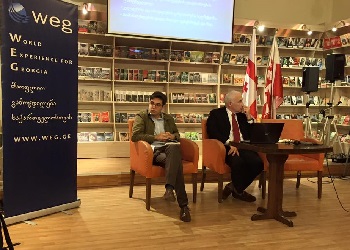Panel Discussion on Subsidies in Energy Sector
- Details

On October 6th, ISET-PI research fellow, Levan Pavlenishvili of the Energy and Environment Policy Research Center, participated in a panel discussion organized by World Experience Georgia (WEG) at Ligamus Book shop of Ilia State University. The panel discussed Discussion subsidies in the energy sector and it was attended by representatives of academia and other sector stakeholders including WEG representatives Mr. Murman Margvelashvili and Mr. Giorgi Mukhigulishvili. Panelists started with a review of international practices of subsidies in energy sector detailing the 30 main branches and 500 various types of subsidies in energy sector. Furthermore, Mr. Murman Margvelashvili presented types of subsidies used in power generation and consumption sectors, as well as in other energy sources.
Chief of Political and Economic Affairs of the US Embassy visited ISET
- Details

On September 30, ISET hosted Dwight Nystrom, Chief of Political and Economic Affairs of the US Embassy. His presentation was titled: “The Reach and Limitations of American Economic Power” and it was focused on US’s footprint on the global economy. Mr. Nystrom also discussed US economic conditions within different sections. According to the data he provided, the US share of GDP in global GDP began declining in 2000 and after the 2008 global financial crisis it began to fall even more sharply. Furthermore, he mentioned merchandise trade partners over the last 35 years. In 1980 case the first three trade partners for US were Canada, Japan and Mexico, but in 2014 Japan was replaced by China. This phenomenon exists for several reasons, but the primary cause is the cheap labor force of China. However, US still remains attractive place for investors, because it still leads the world in foreign direct investment and several other key indicators.










